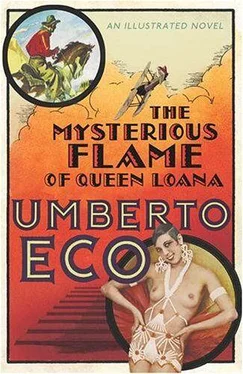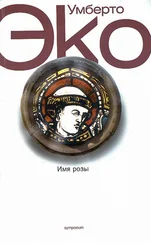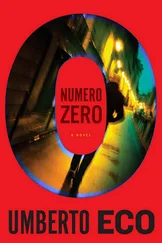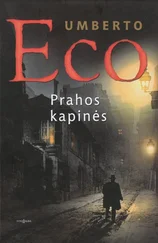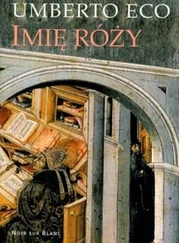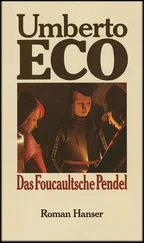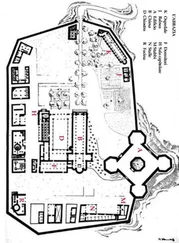Umberto Eco - The Mysterious Flame Of Queen Loana
Здесь есть возможность читать онлайн «Umberto Eco - The Mysterious Flame Of Queen Loana» весь текст электронной книги совершенно бесплатно (целиком полную версию без сокращений). В некоторых случаях можно слушать аудио, скачать через торрент в формате fb2 и присутствует краткое содержание. Жанр: Исторический детектив, на французском языке. Описание произведения, (предисловие) а так же отзывы посетителей доступны на портале библиотеки ЛибКат.
- Название:The Mysterious Flame Of Queen Loana
- Автор:
- Жанр:
- Год:неизвестен
- ISBN:нет данных
- Рейтинг книги:3 / 5. Голосов: 1
-
Избранное:Добавить в избранное
- Отзывы:
-
Ваша оценка:
- 60
- 1
- 2
- 3
- 4
- 5
The Mysterious Flame Of Queen Loana: краткое содержание, описание и аннотация
Предлагаем к чтению аннотацию, описание, краткое содержание или предисловие (зависит от того, что написал сам автор книги «The Mysterious Flame Of Queen Loana»). Если вы не нашли необходимую информацию о книге — напишите в комментариях, мы постараемся отыскать её.
The Mysterious Flame Of Queen Loana — читать онлайн бесплатно полную книгу (весь текст) целиком
Ниже представлен текст книги, разбитый по страницам. Система сохранения места последней прочитанной страницы, позволяет с удобством читать онлайн бесплатно книгу «The Mysterious Flame Of Queen Loana», без необходимости каждый раз заново искать на чём Вы остановились. Поставьте закладку, и сможете в любой момент перейти на страницу, на которой закончили чтение.
Интервал:
Закладка:
In brief, I went down. The darkness was nearly total, barely striped by a few slivers of light from the shutters, which no longer closed properly. In the dark that space seemed immense. I went at once to open the windows: the chapel, predictably, was as large as my grandfather’s study and my room put together. I saw the dilapidated remains of a gilded wooden altar, against which four mattresses were still leaning: no doubt the beds of the fugitives, though I found no other traces of them, which indicated that the chapel had been occupied afterward, at least by me.
Along the wall in front of the windows I saw some shelves of unfinished wood, full of printed matter, newspapers and magazines, in piles of unequal heights, as if each pile were a separate collection. In the middle of the room, a long table with two chairs. Next to what should have been the entry door (marked by the crude masonry put up in an hour by my grandfather and Masulu, with mortar overflowing between the bricks-after all, they had been able to trowel it smooth only from the outside, not the inside) I found a light switch. I tried it without hope, and indeed nothing came on, though several bulbs hung from the ceiling at regular intervals, each beneath a white plate. Perhaps over the course of fifty years the mice had gnawed through the wiring, assuming they had been able to get through the trapdoor-and mice have ways. Or my grandfather and Masulu might have destroyed it all when they were walling up the door.
At that hour, the daylight sufficed. I felt like Lord Carnarvon setting foot in Tutankhamen’s tomb after millennia, and the challenge was to avoid getting stung by some mysterious scarab that had been lying in wait all that time. Everything in there had remained as I must have left it after my last visit. Indeed, I did not want to open the windows too much, just enough to see, so as not to disturb that sleeping atmosphere.
I did not yet dare even look at what was on the shelves. Whatever was there, it was mine and only mine, otherwise it would have remained in my grandfather’s study and been shoved into the attic by my aunt and uncle. At this point, why bother trying to remember? Memory is a stopgap for humans, for whom time flies and what has passed is past. I was enjoying the marvel of beginning ab ovo. I was doing again the things I had once done, passing like Pipino from old age into early youth. From then on, I should have retained only what was to happen to me later, which after all would have been the same as what had happened to me back then.
In the chapel, time had stopped, or rather, no, it had gone backward, like a clock whose hands have been turned back to the day before, and no matter that yesterday’s four o’clock looks like today’s, you simply have to know (and I alone knew) that it is the four o’clock of yesterday, or a hundred years ago. That is how Lord Carnarvon must have felt.
If the Black Brigade were to discover me here now, I was thinking, they would assume I was in the summer of 1991, whereas I (I alone) would know I am in the summer of 1944. And even that officer with the gloves would have to doff his hat, for he would be entering Time’s Te m p l e.
11. Up There at Capocabana
____________________
I spent many days in the chapel, and when I left in the evenings I would take a bundle of things and spend all night looking through them in my grandfather’s study, beneath the green lamp, with the radio on (as I now believed), to fuse what I was listening to with what I was reading.
The shelves of the chapel contained the comic books and comic albums of my childhood, not bound, but nicely arranged in ordered piles. These items had not belonged to my grandfather, and their dates started in 1936 and finished around 1945.
Perhaps, as I had already imagined from my conversations with Gianni, my grandfather was a man from another era and had preferred that I read Salgari or Dumas. So I, to reassert the rights of my imagination, had kept my comics beyond the range of his control. But since some of them went back to 1936, before I started school, that meant that someone else, if not my grandfather, had bought them for me. Maybe there had been some kind of conflict between my grandfather and my parents-"why do you let your son look at that trash?"-but my parents, having read some of those things as children themselves, had indulged me.
Indeed, the first pile contained several years’ worth of Il Corriere dei Piccoli , the illustrated children’s weekly, and the issues from 1936 bore the inscription "Anno XXVIII"-not of the Fascist Era, but of that publication. So Il Corriere dei Piccoli had been around in the early years of the century, no doubt gladdening my parents’ childhoods-they may even have enjoyed reading it to me more than I enjoyed having it read to me.
In any case, paging through the Corrierino (I instinctively began using that diminutive) was like reliving the tensions I had experienced in the preceding days. Without in any way distinguishing one from the other, the Corrierino spoke of Fascist glories and of fantasy worlds inhabited by grotesque fairy-tale characters. It offered me stories and serious cartoons of absolute Fascist orthodoxy alongside paneled pages that were, by all appearances, American in origin. The only concession to tradition: in strips that had originally used speech balloons, the content had been eliminated, or had been retained merely as decoration: all the stories in the Corrierino had captions-long prose captions for the serious ones, nursery rhymes for the funny ones.
Here follows the adventure / of Signor Bonaventure: this was a story, which certainly touched a chord, about a gentleman with improbably wide-legged white trousers, who, thanks to some completely accidental intervention, always receives a million-lira reward (this in the days of a thousand lire a month) and yet by the next episode is indigent again, awaiting another stroke of luck. Perhaps he was a squanderer, like the oh-so-content Signor Pampurio, who-in each new installment-wants to move to a new apartment. I concluded from the style and the artists’ signatures that both of these strips were of Italian origin, like the strips about Formichino and Cicalone (a diminutive ant and a chatty cicada), Signor Calogero Sorbara (who is always preparing to go on a trip), Martin Muma (who is light as a feather and flies on the wind), and Professor Lambicchi (who invented an amazing superpaint that brings his portraits to life, so that his house is always being invaded by troublesome figures from the past, now a furious Orlando Paladino, now one of the kings from a deck of cards, irritated and bitter about having been removed from his throne in the Land of Make-Believe).
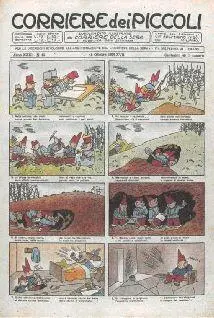
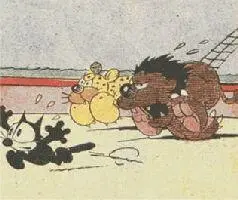
But indisputably American were the surreal landscapes of Felix the Cat, those colonial rascals the Katzenjammer Kids, Happy Hooligan, and Jiggs and Maggie (with those Chrysler Building interiors in which figures emerged from their picture frames on the wall).
It was hard to believe that the Corrierino had brought me the adventures of the soldier Marmittone (dressed exactly like my Soldiers of Cockaigne!) who, thanks to unlucky genes or to the stupidity of decorated generals with risorgimento mustaches, always ended up in prison.
Not much of a warrior or Fascist, this Marmittone. And yet he was allowed to cohabit with other strips that told, in an epic rather than grotesque tone, of young heroic Italians fighting to civilize Ethiopia (in "The Last Ras," the Abyssinians who had resisted our invasion were dubbed marauders) or, as in The Hero of Villahermosa, protecting the flanks of Franco’s troops against the ruthless Republicans in their red shirts. Of course this last strip failed to inform me that although some Italians were battling alongside the Falangists, others were fighting on the other side, in the International Brigades.
Читать дальшеИнтервал:
Закладка:
Похожие книги на «The Mysterious Flame Of Queen Loana»
Представляем Вашему вниманию похожие книги на «The Mysterious Flame Of Queen Loana» списком для выбора. Мы отобрали схожую по названию и смыслу литературу в надежде предоставить читателям больше вариантов отыскать новые, интересные, ещё непрочитанные произведения.
Обсуждение, отзывы о книге «The Mysterious Flame Of Queen Loana» и просто собственные мнения читателей. Оставьте ваши комментарии, напишите, что Вы думаете о произведении, его смысле или главных героях. Укажите что конкретно понравилось, а что нет, и почему Вы так считаете.
